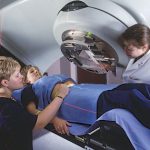
The National Institutes of Health today awarded University of Central Florida Professor Ming Su its coveted New Innovator award, which comes with a $2 million grant.
Su, associate professor at UCF’s NanoScience Technology Center, is the only researcher from a Florida university to be selected and only one of 82 recipients nationwide announced today.
The award recognizes visionary science that exhibits the potential to transform scientific fields and speed the translation of research into improved health, according to the NIH director’s office. Su’s research focuses on using nanoparticles to concentrate and precisely direct radiation energy to destroy cancerous tumors.
Su says nearly half of cancer patients receive radiation therapy at some point during treatment, but X-ray doses can damage normal tissue around the cancer. The idea of using nanoparticles to improve radiation therapy has been studied for the past several years as a way to enhance the potency of the cancer killing radiation, while limiting damage to surrounding healthy cells.
Because of the imprecise nature of radiation it is often used at lower dose than required, Su said. But that can lead to incomplete killing of cancer cells and recurrence of a tumor later.
Su will be using nanoparticles in way they have not been used before – so that radiation energy will be deposited preferentially to tumors.
“By doing so, the total X-ray dose required to kill the tumor will be reduced, and the damage to normal tissues will be minimized,” Su said.
The award is one of 10 Pioneer awards, 51 New Innovator awards, and 20 Transformative Research awards announced by the NIH today. The total funding is approximately $155 million.
The program funding all the projects, the High Risk Reward program, supports a series of exceptionally high-impact research programs that are broadly relevant to health and disease.
“The Common Fund High Risk High Reward program provides opportunities for innovative investigators in any area of health research to take risks when the potential impact in biomedical and behavioral science is high,” said NIH Director Dr. Francis S. Collins.
The New Innovator Award received by Su supports investigators who had received their Ph.D. or M.D. within the last ten years.
Last year Su received the National Science Foundation’s prestigious early CAREER award for a project using phase change nanoparticles as thermal probes to detect multiple cancer biomarkers.
Reprinted from UCF Today.